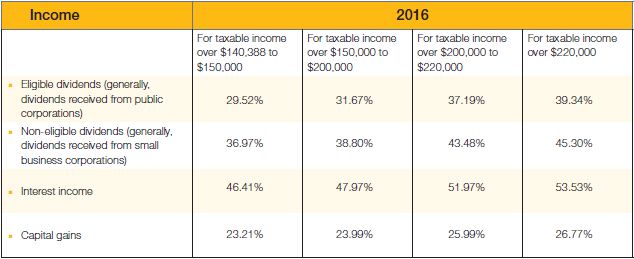33 Easily adaptable tax ideas for you and your family
Our annual Tax Tips can assist you in your tax planning.
It presents some quick ideas and strategies. Please take the time to review your 2016 tax situation and call us for specific recommendations tailored to meet your needs. We will be pleased to work with you on these and other tax-savings ideas.
Investment income
1. Tax rates are significantly more favourable for dividend income than interest income.
- The top personal tax rates in Ontario for 2016 are as follows:

- The top personal tax rates are not expected to change for 2017.
- Re-evaluate your investment strategy by comparing the pre-tax dividend rates with the pre-tax interest rates using the chart provided on page 15.
2. Defer tax on interest to the following year by investing funds for a one-year term ending in the next calendar year.
3. Defer purchases of mutual funds until early in the next calendar year to minimize taxable income allocated in the current year from the mutual fund.
4. Existing holding companies that have built up refundable dividend tax should consider paying dividends to recover this tax. Depending on its year-end, the company may have up to 24 months to enjoy the benefits of the tax refund before the shareholder is required to pay the personal tax on the dividend. The individual circumstances should be reviewed.
Capital gains and losses
5. If you own qualified small business corporation (QSBC) shares or qualified farm and fishing property, you may benefit from the lifetime capital gains exemption of $824,176. The exemption is indexed to inflation annually.
- The government has maintained the exemption of $1,000,000 for qualified farm and fishing property. The exemption is available on dispositions made on or after April 21, 2015.
6. Consider realizing accrued losses on investments to shelter capital gains realized this year and in the previous three years.
- Note that a loss realized from the disposition of an investment may be denied if you repurchase the investment within a short period of time.
7. If you have significant trading activity, your sales of securities may be considered a business for income tax purposes.
- If your sale of securities is considered a business, your profits will be fully taxable as income (instead of being considered capital gains taxable at 50%), and your losses will be fully deductible against any source of income.
- If you are concerned about your sales of securities being considered a business, you can consider filing a one-time, non-revocable election with the Canada Revenue Agency.
- This election will treat all of your gains from dispositions of Canadian securities as capital gains (and all of your losses as capital losses) for the current year and all future years.
Charitable donations
8. Consider donating publicly-traded securities instead of cash.
- A tax-advantaged gift of securities can be made to a private foundation as well as to public charities. Any appreciation in the value of the securities will not be subject to capital gains tax if the securities are donated to:
- A registered charity; or
- A private foundation after March 18, 2007. There are special rules that apply to persons not dealing at arm's length with the foundation. For more information, please contact us.
- The donation credit (for individuals) or deduction (for corporations) continues to be available for the fair market value of the securities donated.
- To avoid capital gains tax on the appreciated securities, the actual securities must be transferred to the charity or foundation.
- Similar rules will apply to a capital gain on ecologically sensitive land donated to a conservation charity.
- Due to 2011 changes to the tax rules, the donation of flow-though securities may trigger a capital gain to the donor.
Note: The Federal Government has abandoned the proposal to have the same benefits apply on the capital gains arising from the disposition of private corporation shares or real estate.
Did you know?
The Liberal Government announced some changes to the tax rules associated with the disposition of a principal residence and the eligibility for the principal residence exemption (PRE). Please refer to Crowe Soberman LLP's October 2016 Tax Letter (http://crowesoberman.com/tax-letters/changes-canada-principal-residence-exemption-claim/ ) for details on the new tax measures. In summary, the following new rules have been introduced:
- A non-resident will not be eligible for the PRE in respect of the year a property is acquired unless he/she was a resident of Canada in that year.
- Only certain trusts will be eligible to claim the PRE. Many ordinary family trusts holding a principal residence that is inhabited by one or more beneficiaries will have restrictions on the PRE under the new rules. There are transitional rules that will allow such trusts to utilize the PRE on the accrued gain on the property up to December 31, 2016. Any future appreciation in the property would be subject to tax.
- The property can be distributed to one of the beneficiaries (only to the extent he/she ordinarily inhabits it) on a tax-deferred basis. The beneficiary can then sell the property and claim the PRE personally. The transfer of the property from the trust to the beneficiary can occur after December 31, 2016, but the beneficiary must continue to ordinarily inhabit the property if he/she wants to fully shelter the gain with the PRE on a future sale. Note that the trust itself will no longer be eligible to claim any portion of the PRE in respect of gains accrued after December 31, 2016.
- All dispositions of principal residences must be reported on Form T2091, whether or not the gain is sheltered by the PRE. Penalties for non-compliance will apply. Reporting requirements apply for the 2016 and future tax years.
- CRA may reassess a taxpayer's return beyond the three year normal statutory asssessment period when a disposition of a principal residence is not reported.
*Click here to continue reading*
The content of this article is intended to provide a general guide to the subject matter. Specialist advice should be sought about your specific circumstances.

